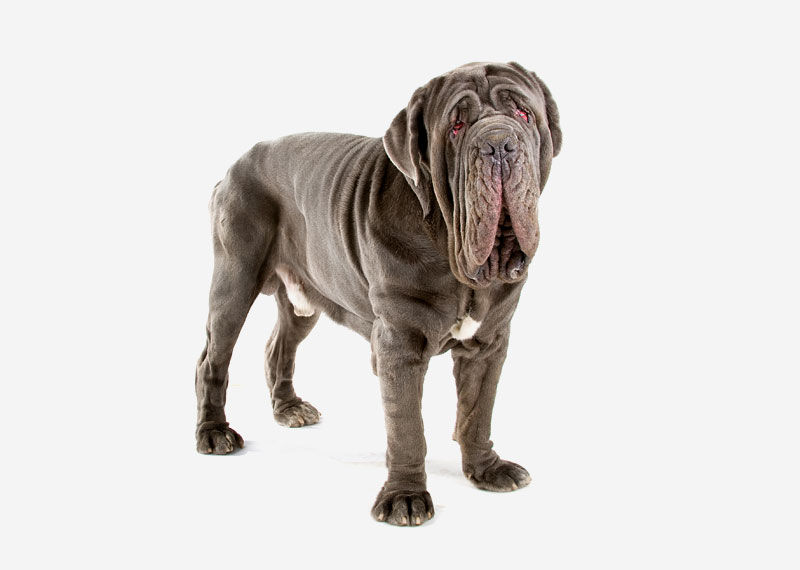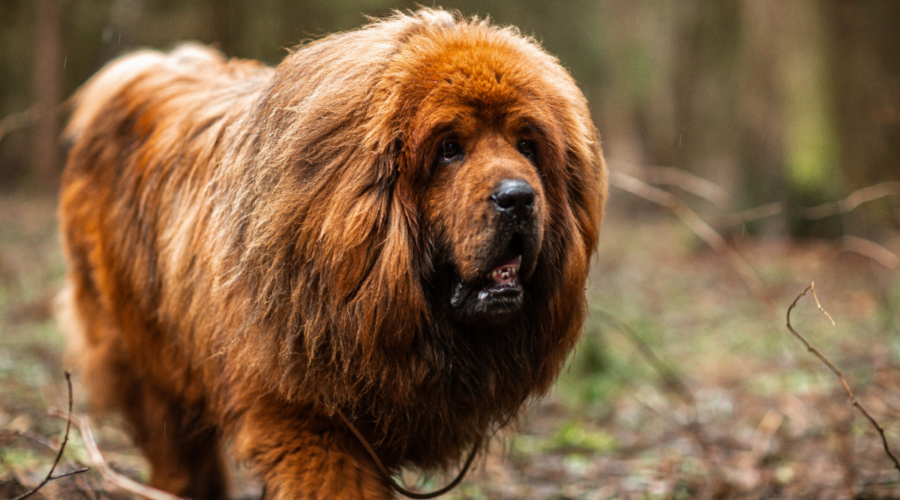Mastiff dogs have excess skin due to a variety of reasons. One of the most important reasons is that it gives the dog with an advantage in combat. The skin of the dog is protected from animal bites and scratches by being loose. Mastiffs can take on predators with ease, which allows them to move and snap back without sustaining severe injury. Furthermore, the loose skin on the neck of a Mastiff can allow the dog to turn and move around easily, which is vital for hunting and tracking prey. The skin on their necks and faces can also form wrinkles that help channel the water away from their eyes and mouth which is beneficial when they're drinking or swimming. It can regulate the temperature of the dog. The skin helps to insulate the dog to keep it warm in cooler weather, and cool in hotter temperatures. The loose skin allows dogs to sweat and heat dissipate through the skin. This is a fantastic method to regulate the temperature of their body. Mastiffs' loose skin has changed over time to serve multiple functions that include protection and flexibility, as well as temperature regulation. See the top rated pitbull loose skin around neck advice for website tips.

How Often Should You Take A Walk With Your Mastiff?
The frequency and duration of walks for the Mastiff depend on many factors, including the dog's age, size, activity level, and overall health. A typical adult Mastiff ought to be walking at least each day for 30 to 45 minutes. Dogs of all ages and puppies might require shorter walks, longer breaks or less vigorous exercise, based on their personal needs. It's important to remember that Mastiffs are a big and powerful breed, and they require strong and confident management to ensure their safety and well-being on walks. Mastiffs can also suffer from joint issues or other health issues. As such, it's crucial to limit their exercise, especially if they still have a long way to go. Mastiffs benefit from daily walks as well as other types of mental stimulation such as playing in a yard that is fenced or playing games that are interactive. These kinds of activities will not only help keep your Mastiff fit and healthy physically but mentally, but can assist in strengthening the bond between you two. A qualified dog trainer, veterinarian or vet can assist you in determining the ideal exercise routine for your Mastiff. A dog trainer who is qualified can help you develop an exercise plan that fits the needs of your Mastiff. They will assist in ensuring that your Mastiff is healthy, happy and well-adjusted. Read the most popular mastiff exercise details for website tips.

How Important Is Obedience Training & Early Socialization For Tibetan Mastiffs
Tibetan Mastiffs require obedience training and early socialization. Tibetan Mastiff puppies can benefit from socialization as early as they can. This will help them be positive about people, animals, and new locations, and also learn how to behave. It also assists in preventing behavior problems that may develop because of fear, aggression, or shyness.Tibetan Mastiffs are known for being determined and independent, which is why obedience training is important to build a strong bond between the dog's owner and the dog. It is recommended that you begin training in obedience as soon as the puppy is eight to twelve weeks old. Positive reinforcement techniques like reward, praise, and toys can be used to reward and motivate dogs who exhibit good behavior.
It is also crucial to keep training in obedience throughout the life of the dog to help reinforce good behavior and stop the development of bad habits. Training sessions are to be short and frequently and should be tailored to the dog's character. Read the recommended Tibetan mastiff breed site for website tips.

What Are The Personality Traits Of The Great Dane, German Mastiff?
Great Danes, also known as German Mastiffs are large dogs with huge heads. They are known for being friendly and charming. Here are some of their characteristics and the most notable features. Size- Great Danes have a height of 32 inches when measured at the shoulder, and can weigh up 175 pounds.
Appearance: They sport a sleek, muscular body with a short, curvy coat that can come in many colors including blue, black and brindle.
Personality: Great Danes are kind, patient and loving. They make excellent family dogs and are famous for their affectionate and loyal nature.
Great Danes have intelligence and are good in training. They are happy to please their owners and are a a joy for trainers to work with them.
Temperament: Great Danes have an easy, relaxed temperament but can show some protection instincts when they are needed.
Great Danes' energy levels are quite active despite their size. They only require moderate physical activity and possess an average energy level. Their daily workout routine and playtime are sufficient to keep them happy.
HealthGreat Danes can be susceptible to some health issues like hip dysplasia (bloat) as well as heart disease, and other ailments. These problems can be managed through preventative care and regular vet checkups.
Great Danes are gentle giants and are great pets for families. They are very affectionate and relaxed making them ideal pets for families. View the top rated Great Dane German Mastiff breed great info for site info.

How Important Is Obedience Training And Early Socialization Of Great Danes? (German Mastiffs).
Great Danes have been trained to the highest level in obedience training and early socialization. The Great Danes can be hard to handle and can be difficult for dogs with the size and strength. It is crucial that Great Danes are socialized as early as possible in the beginning, ideally between the ages of 3-14 weeks. Being exposed to different people, places and events is vital to help your Great Danes develop a confident and well-adjusted personality. To ensure they obey the commands of their owners and behave in a manner that is acceptable it is essential that they receive basic obedience training.
Positive and reward-based training should be encouraged using treats, praise as well as toys. It is vital to be constant and patient with your dog.
Great Danes require exercise daily in order to stay healthy, happy, and avoid destructive and boredom. While walking them on a regular basis or spending an hour in the yard is recommended however, it's not recommended to exaggerate them while they're developing and young. A veterinarian should be consulted for a workout plan for each dog to meet the needs of their pet. See the best Great Dane German Mastiff breed link for website recommendations. Read more Recommended Advice When Buying The Best Mastiff Msftip e849802
